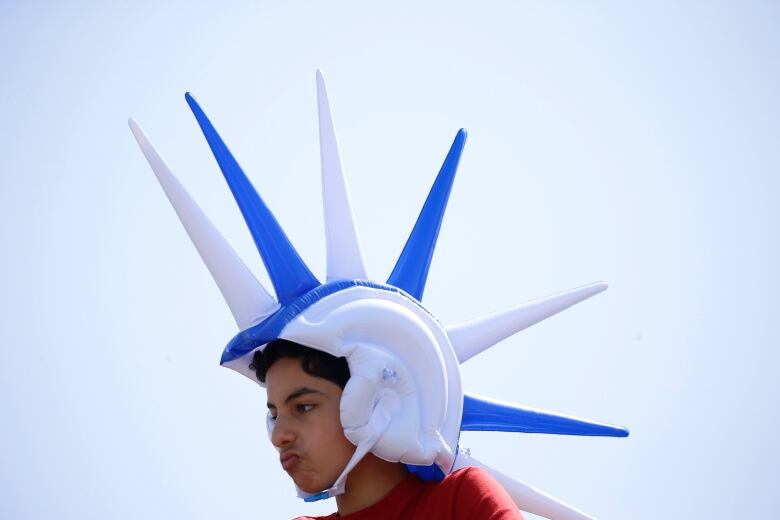Israel celebrates 70th anniversary of independent Jewish state
Day of celebration is sombre day of commemoration for Palestinians who lost 1948 Arab-Israeli war

Israelis marked the70thanniversary of their independence Thursday, withcelebrations taking place across the nation of nine million.
Prime Minister BenjaminNetanyahuattended the country's annual Bible Quiz in Jerusalem, in which young Jewish scholars from around the world compete.
In an Independence Day message,he praised the "men and women from every walk of life,young and old, Jew, Christian, Muslim, religious and secular" who have worked hard to build the nation.
"Israel's success didn'thappen overnight," he said.
He praised Israel's technology andingenuity, which, he said, has helped improve lives around the world.
"Here's the best part: we're just getting started," Netanyahu said. "Seventy years is the blink of an eye in historical terms. I have no doubt that 70 years from now, Israel will be even stronger and even more prosperous than it is today."
Happy Independence Day, Israel! pic.twitter.com/6PZxBbhbcr
—@IsraeliPMIndependence Day festivities, which included barbecues, beach parties and air force flybys,began Wednesday night, when in sharp contrast, Israel abruptly crossed over from its melancholy Memorial Day for fallen soldiers and terrorism victims.
The grouping of the two days is intentional, to show the link between the costly wars Israel has fought and the establishment and survival of the Jewish state.

Israel has much to celebrate a standard of living that rivals Western Europe and scientific achievements and military and technological clout beyond its modest size but it's also a country that is weary from decades of conflict with the Palestinians, for which it has received criticism.
Israel's relations with the Palestinian Authority in the West Bank are poor; its relations with Gaza's militantHamasrulers, who seized the territory from the Palestinian Authority in 2007, are hostile.
Strange juxtaposition of revellers and demonstrators
As many Israelis celebrated,thousands of members of the country's Arab minorityturned out fora rally to commemorate what Palestinians call their catastrophe, or Nakba an allusion to the war they lost 70 years ago that resulted in the birth of the modern Jewish state.
In a field near Atlit,an Arab villagesouth of Haifa that was depopulated and abandoned in 1948, children read the lyrics of nationalist anthems from theiriPhoneswhile their elders sat beneath awnings, listening to dignitaries and musicians.
The rally organizers said170 people were driven out of the small coastal villagein 1948and fled to other towns or into neighbouring countries. Lebanon has around 450,000 Palestinian refugees registered with the United Nations refugee agency, many living in the country's 12 refugee camps.
"I never miss any event related to the Nakba," said Sami Salman, 83, a carpenter originally from Nazareth who attended the rally. "Many people left for Lebanon back then, but fortunately for us we did not have enough money to go. I am very glad about that now."

There was a strange juxtaposition on the crowded holiday streets around Haifa on Thursday morning. Coaches from Jerusalem, Nazareth and other towns filled with Arabs headed to the Nakba rally, past long lines of cars bearing blue and white Israeli flags heading in the opposite direction to the coast, for the traditional picnics and beach parties at which Israelis celebrate Independence Day.

Similarly, as demonstrators at the Nakba rallywavedPalestinian flags and wore T-shirts proclaiming Jerusalem to be "the eternal capital of Palestine,"Netanyahuannounced in Jerusalem that "at least half a dozen"countries were considering moving their embassies to Jerusalemfollowing the U.S. decision to do so.
U.S. President Donald Trump announced in December that theUnited States recognized Jerusalem asIsrael'scapital,infuriating evenWashington's Arab allies and dismayingPalestinians who want the eastern part of the city as theircapital.
The U.S. Embassy is due to relocate to Jerusalem from TelAviv on May 14, the date on which Israel's independence is marked on the Gregorian calendar (vs. the Hebrew calendar).
Hoping to return
Over at Atlit, the Arabs at the rally were mostly the descendants of Palestinians who did not go into exile. One of the main issues promoted by the organizers is the longstanding demand for the right of return of Palestinian refugees.
Palestinians and some Israeli scholars view the the refugee problem as the result ofa systematic program of ethnic cleansing ordered by Zionist leaders to clear the way for the Jewish state.
Israel rejects this, saying that the refugee problem resulted from a war launched by Palestinians opposed to a UN partition plan adopted in 1947, and by Arab states which invaded as soon as the British Mandate expired in 1948.

Before fighting began in late 1947, about a million Arabs and 600,000 Jews lived in what was to become Israel. Israel emerged with 78 per cent of Mandate Palestine. The UN plan, rejected by the Arabs, would have given it 56 per cent.
Successive Israeli governments have ruled out any right of return, fearing that the country would lose its Jewish majority.
But the refugees in Lebanon have not given up hope, even amid the stench of the sewers at the Shatila refugee camp in southern Beirut.
"I won't live to see it, but my children might," said Abdel Majid Al Shura, 42. "Seventy years is nothing in the history of the world."
With files from The Associated Press, CBC News












_(720p).jpg)


 OFFICIAL HD MUSIC VIDEO.jpg)
.jpg)



























































































